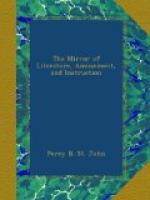The property of a paper is a matter of which most people have a very vague and imperfect knowledge. I believe I am very near the truth when I state the gross proceeds of The Times at 45,000l., a year. The present proprietor of The Morning Chronicle gave for it, I believe, 40,000l. The absolute property of The Courier, according to the current rate of its shares, is between 90,000l. and 100,000l. Estimating the value of The Globe on the same scale, the absolute property of it is probably somewhere about 35,000l. The profits of a paper arise almost entirely out of its advertisements, and hence the difference in value between the two last, notwithstanding their circulation is so nearly equal. A newspaper gets its advertisements by degrees, and, as it is supposed by the public, its numbers increase; but it retains them long after the cause by which they were acquired has vanished. It is thus that The Courier, which got its advertisements when it basked in all the sunshine of ministerial patronage, retains these when its numbers are reduced by one-half, and the countenance of government is no longer held out to it.
These, however, it must be admitted, are the prizes in the lottery of newspaper speculation: and in this, as in every other lottery, there are more blanks than prizes. Mr. Murray, after having expended upwards of 10,000l. on his Representative, sold it to the proprietors of The New Times for about 600l.: and The British Press, after having ruined I know not how many capitalists, was sold to the same concern for, I believe, a considerably smaller sum.—London Magazine.
* * * * *
MADEMOISELLE CUVIER.
Mademoiselle Cuvier, daughter of the celebrated naturalist, died a short time since at Paris. There has seldom been any instance where the strongest benevolence was so closely united to the charms of intellect. She possessed a rare mixture of elevation of mind and firmness of character—of strength and equanimity—sweetness and simplicity. It was truly gratifying to witness her worship, or rather superstition, for truth, and to watch the avidity with which she used to seize and illustrate whatever she thought likely to remove ignorance, or promote the cause of virtue and freedom. The circumstances which attended the death of this amiable creature, have, if possible, greatly augmented the grief of her family and friends. The day of her nuptials was fixed, and she was to be united to a man of her own choice, and everything was prepared for the ceremony. Being suddenly afflicted by rapid symptoms of consumption, all hopes of her recovery soon vanished. Notwithstanding, the ball dresses, veils, and shawls, continued to be sent home to the unhappy parents, who dared not refuse them, lest they should themselves be accused of giving way to despair. This mixture of preparations for rejoicing, and the certainty of death, formed a picture the most melancholy




